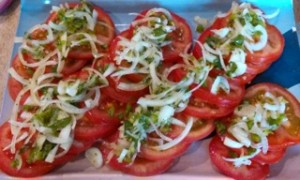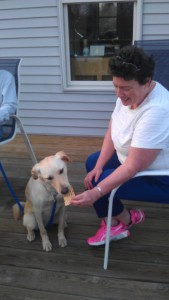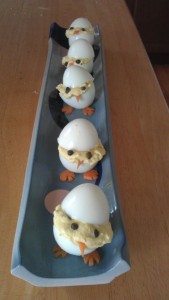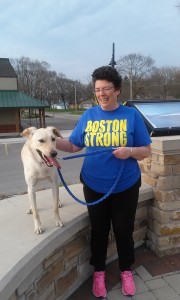Oh what a week. Eight Days a Week.
One: Sometime last Monday, while I was getting my hair cut, I had an epiphany. People who love to host Passover relish in the physicality of it. It always seems to involve moving tables and chairs, sometimes reversing living rooms and dining rooms. Why? Why do we get chained to the way we always do this holiday that is about freedom? Then when I was lamenting that my house didn’t look like Better Homes and Gardens, someone said something so simple, it was liberating. “The goal is not to look like Martha Stewart. The goal is to be in the middle. No one wants to go to Martha Stewart’s house. They would be afraid to put a glass down.” This comment made me relax. We want people to enjoy being at our house. It should be clean. It should be neat. But it doesn’t have to be perfect. It has to be comfortable. Given this advice, our sederim were lovely.
Two: Our house were filled with guests for the seder. 16 this year. A total of eight of us spent the night. It seemed a little like camping. Maybe that is what the Israelites felt like when they were leaving Egypt. Somehow I doubt it. Even though some chose to sleep on the floor, this was a little more cushy than wandering in the desert afraid for our lives. Two of our guests were from Africa. One of our guests taught in Tanzinia and one recently returned from a safari there. The evening was rich with good food, even some African specialities, good conversation and all the traditional (and not so traditional) words and songs of the seder. Exhausting but worth every minute. AND the best part, I got to sit for most of it! Thanks Simon, Sarah and Jack!
Here is the recipe for Kachumbari, Tomato and Onion Salad:

Kachumbari is a Swahili name for fresh Tomato and Onion Salad which is common in East Africa especially Kenya and Tanzania. It consists of fresh Ingredients and its very easy and quick to make.
- 3 – 4 Tomatoes
- 1 Medium Onion
- Juice of one small Lime
- 2 tsp Olive oil
- 1 tsp sea salt
- 1 tsp ground pepper
- 2 small chilies (Optional, we used half a jalapeño)
- Fresh garden Coriander (Optional, we used fresh parsley)
Instructions
- 1. Slice the onions into thin rings (or chop them finely), put them into a bowl, add a small amount of salt and rinse them with cold water to reduce acidity.
- 2. Add sliced tomatoes, chilies and coriander.
- 3. Mix together lime juice, Olive oil and toss the mixture into the Kachumbari. Season with salt and pepper and serve immediately.
Three: Thanks to Risa Cohen. After years of studying my Bat Mitzvah Torah portion, 40 to be precise plus a rabbinic dissertation on it, Risa explained something I had missed. In Ashrei, it reverses rachum v’chanun to chanun v’rachum. Why? I thought there was great meaning in it. Maybe not. The Psalmist needed it as chanun v’rachum to fit the alef-bet order. She may be right. Part of the reason I love being a rabbi and I love Torah discussions is because of the learning from others. Torah discussions are “holy sparks flying.”
Four: There are deeper meanings of Passover. How wonderful to spend a morning helping make five new Jews. A mother who was already raising her children and her four children, met a group of three rabbis at the Community Mikveh in Wilmette. When they went into the water, they were friends of Judaism. When they came out of the mikveh, they were Jewish. Talk about rebirth, renewal and coming out of the narrow places. This is what Passover is all about.
Five: This week marks the 40th anniversary of my Bat Mitzvah. I remember standing on the bimah, reading the very words that I will read on Shabbat thinking to myself (long before we give this speech to kids) that I didn’t want the experience to end. For me, my Bat Mitzvah was only a beginning of a life long love affair with Judaism. Thank you, Rabbi Albert M. Lewis for setting me on this path and for being my rabbi, my teacher, my mentor for all these years! Al always said that each Bat/Bar Mitzvah student receives exactly the right portion for them. For me, he was right. This year, however, after writing my rabbinic thesis on the same passage, I was afraid I would have nothing new to say. My portion contains the 13 Attributes and has sustained me as Jewish leader (“Moses you look weary.”, the opening line of my Bat Mitzvah speech, a dialogue between G-d and Moses), as a Jew seeking to explain Judaism to Christians who think that the G-d of Israel is a G-d of vengeance and that G-d of the New Testament is a G-d of love, and is what ultimately led me to become a rabbi. Today as I stand on the bimah, I am proud of my bimah skills, skills that began 40 years ago. Even more so, I am proud of the compassion I have learned through the years and the ability to lead, plead, inspire, cajole a congregation to make the world a better place. Let us hope for at least another 40 years.
Six: I woke up singing a song today. A Beatles song. Eight Days a Week. You might think that is odd for Passover, but strangely not. You see, Passover is an eight day week. For a couple of days now I have felt unsatisfied with the food we are eating. I am tired (already) of matzah. I am even tired of chocolate matzah. How is that even possible? I get up from the table and I am still hungry. Hungry for something. Maybe it is not food. Maybe it is that I am hungry for love. It seems this song with the lyrics:
Eight days a week
I love you
Eight days a week
Is not enough to show I care
is like my Bat Mitzvah portion and my haftarah portion, Song of Songs, meant to reassure people like me that G-d does in fact love us. Eight days a week. All the days of Passover. All the nights of Passover. All eight of them. Not just seven. Maybe that is why Passover needs to be eight days and not just the Biblical seven. Even longer. For a thousand generations. Forever. G-d loves us forever.
Seven: Easter Sunday morning we had religious school. Only about a third of our students showed up. That makes sense. Half our students are in interfaith families. What was surprising to me was how little our older students know about Easter. Sure, they knew about dyed eggs and Easter Egg hunts, chocolate bunnies and Easter baskets. Not one could tell the story of Jesus. Not one knew about Good Friday. So I started Ruach, our assembly with a question. Why is this hard boiled egg here? They thought maybe my breakfast–and that was true. So I began to teach. For 30 minutes I taught about Easter and Passover, how one came out of the other. How many think that Jesus’s Last Supper was a seder meal. How Jesus was crucified (by the Romans), died and then on the third day was resurrected. How the concept of resurrection, coming back from the dead actually is a Jewish concept. My hope would be that we have equipped our children to be better citizens of the world, better citizens of this country.
Sunday afternoon was a real taste of freedom. We had beautiful spring weather. We ate lunch and dinner on our deck (and none could make us afraid). We played boggle. We cooked. We ate wonderful food and yes, now I have eaten and were satisfied. Even the dog loves his matzah. It’s his favorite holiday. (He even likes horseradish and chopped liver!). 
Eight: On the eighth night of Passover we had dinner with Simon’s cousins. We finally had time. We enjoyed a great, leisurely dinner of lamb and quinoa (always quinoa this year), Sarah’s chocolate covered matzah and perhaps even more importantly great conversation. There is always great conversation in that house. We talked about Kenya, about Kosher for Passover wine, about politics, about American Jewish World Service (long time supporters, those Adams!). We talked about mentoring and the role it plays in helping students succeed and how proud when one of our students graduates. And just as I had gotten up because I had to lead yizkor in the morning, about family stories. And maybe that is what Passover is about, telling those family stories, all the way back from “My father was a wandering Aramean” to where Jacob Adams was born in Pozen and the fact that he was a proud German Jew even if living in what we would call Poland. And then the stories of what the name might have been. Adams? Addam? Adom like the first human? Was there a split in the family? Does class and economical status play a role and how do we not pass these slights, these grudges onto the next generation? I didn’t want the evening to end. This is really what yizkor is about. Telling the stories. Making the evening different. The command to remember all the generations who went before.
Nine: Yizkor itself. After the deep experience of feeling free watching the Boston Marathon a year after the bombing, itself a kind of yahrzeit, I felt that yizkor itself was flat. Not so, said one member, who found it particularly moving. “I’ve never been to yizkor, but I woke up thinking (and singing) about my parents and my friend said that yizkor is so important so I came. I was very moved.” During yizkor itself, I was not so much, but putting away the Torah scrolls, when we got to Hashivenu Adonai…I found tears silently dripping down my face. “Renew our days as of old.” That is the hope, the message of yizkor.
So this year, for sure I can say, I did Passover–all of the rites, laws, customs (new and old) are done. As the wise child asks, “What are the testimonies, the statutes and the laws which G-d, our Lord, has commanded you?” You, in turn, shall instruct him in all the laws of Passover”. The questions were many and meaningful, the discussions long and important. I am still learning. Is wild rice kosher for Passover? How do you kasher a stand-mixer? If you start Passover in one time zone and travel to another, which time zone do you end Passover? What is freedom? What are our responsibilities to make the world a better place?
But here is the thing. This year I leave Passover feeling lighter which is not a reflection of the scale. It is a sense of freedom and peace. This response to the end of Passover, to completing all of the seders, services, cooking and cleaning, surprised me. I think it is that I am renewed and ready for the rest of the journey. The question is…can I sustain the feeling?



